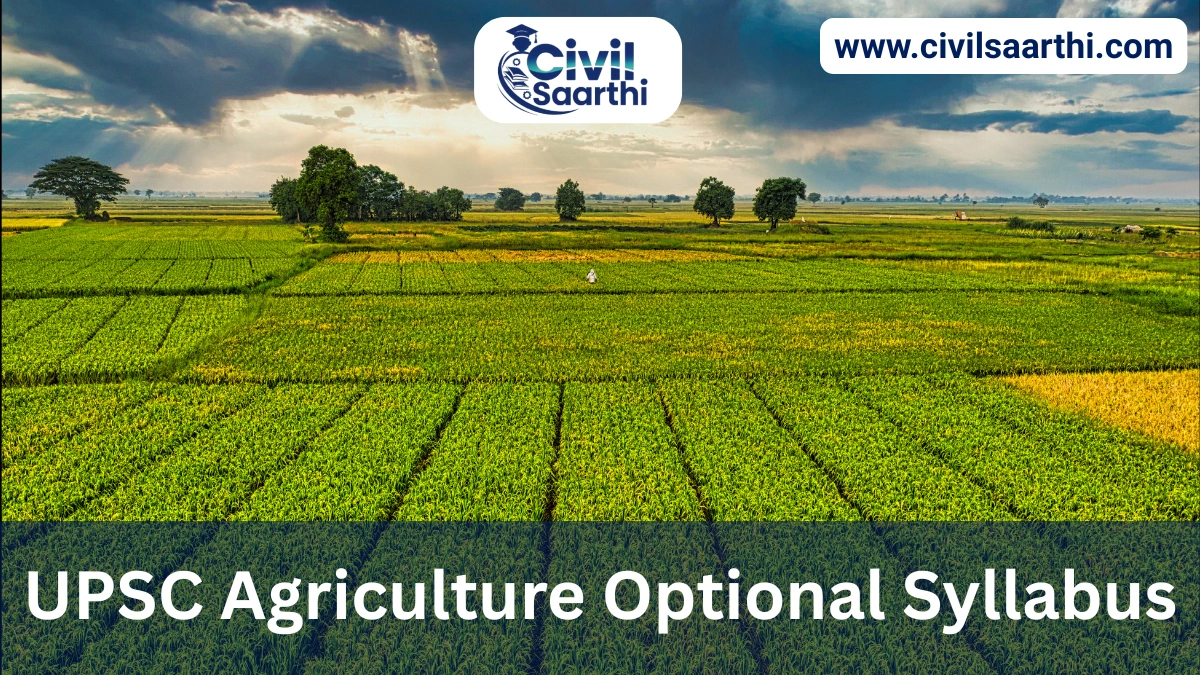The UPSC Agriculture Optional Syllabus is meticulously designed for candidates with a background or keen interest in agricultural sciences. This optional subject is part of the UPSC Civil Services Mains Examination and comprises two papers, each carrying 250 marks, totaling 500 marks. The syllabus encompasses a wide range of topics, including ecology, agronomy, soil science, plant breeding, and agricultural economics, among others. Understanding the detailed syllabus is crucial for effective preparation and scoring well in the examination.
UPSC Agriculture Optional Syllabus
The UPSC Agriculture Optional Syllabus is a scoring and well-structured subject, ideal for candidates with a background in agriculture or life sciences. It covers core topics in Paper I like agronomy and soil science, and advanced subjects in Paper II like plant breeding and biotechnology. Its factual nature, overlap with GS topics, and defined scope make it a strong optional choice for UPSC Mains.
UPSC Agriculture Optional Syllabus: Overview
The UPSC Agriculture Optional Syllabus is divided into two papers: Paper I and Paper II, each of 250 marks. It covers topics ranging from agronomy, soil science, and agricultural economics to plant breeding, biotechnology, and horticulture. This syllabus is especially beneficial for candidates with academic backgrounds in agriculture, botany, or life sciences.
| Overview of UPSC Agriculture Optional Syllabus | ||
| Paper |
| Marks |
| I |
| 250 |
| II |
| 250 |
UPSC Agriculture Optional Syllabus PDF Download
The UPSC Agriculture Optional syllabus is divided into two papers. Paper I covers ecology, agronomy, soil science, forestry, crop protection, irrigation, agricultural economics, and extension. Paper II focuses on genetics, plant breeding, biotechnology, seed technology, physiology, horticulture, food security, and plant protection, making it a scientific yet practical optional subject. The download link has been shared below.
Click here to download UPSC Agriculture Optional Syllabus PDF
UPSC Agriculture Optional Syllabus
The UPSC Agriculture Optional Syllabus consists of topics that reflect the theoretical and practical aspects of agriculture. This subject provides scientific clarity and overlaps with GS papers in topics like environment, economy, and food security. It’s considered a scoring subject due to well-defined boundaries and less subjectivity in evaluation.
UPSC Agriculture Optional Syllabus for Paper 1
- Ecology and its relevance to man, natural resources, their sustainable management and conservation. Physical and social environment as factors of crop distribution and production. Agro ecology; cropping pattern as indicators of environments. Environmental pollution and associated hazards to crops, animals and humans. Climate change—International conventions and global initiatives. Green house effect and global warming. Advance tools for ecosystem analysis—Remote Sensing (RS) and Geographic Information Systems (GIS).
- Cropping patterns in different agro-climatic zones of the country. Impact of high-yielding and short duration varieties on shifts in cropping patterns. Concepts of various cropping, and farming systems. Organic and Precision farming. Package of practices for production of important cereals, pulses, oil seeds, fibres, sugar, commercial and fodder crops.
- Important features, and scope of various types of forestry plantations such as social forestry, agroforestry, and natural forests: Propagation of forest plants. Forest products. Agro-forestry and value addition. Conservation of forest flora and fauna.
- Weeds, their characteristics, dissemination and association with various crops; their multiplications; cultural, biological, and chemical control of weeds.
- Soil—physical, chemical and biological properties. Processes and factors of soil formation. soils of India. Mineral and organic constituents of soils and their role in maintaining soil productivity. Essential plant nutrients and other beneficial elements in soils and plants. Principles of soil fertility, soil testing and fertiliser recommendations, integrated nutrient management Biofertilizers. Losses of nitrogen in soil, nitrogen-use efficiency in submerged rice soils, nitrogen fixation in soils. Efficient phosphorus and potassium use. Problem soils and their reclamation. Soil factors affecting green house gas emission.
- Soil conservation, integrated watershed management. Soil erosion and its management. Dry land agriculture and its problems. Technology for stabilising agriculture production in rainfed areas.
- Water-use efficiency in relation to crop production, criteria for scheduling irrigations, ways and means of reducing run-off losses of irrigation water. Rainwater harvesting. Drip and sprinkler irrigation. Drainage of water-logged soils, quality of irrigation water, effect of industrial effluents on soil and water pollution. Irrigation projects in India.
- Farm management, scope, importance and characteristics, farm planning. Optimum resource use and budgeting. Economics of different types of farming systems. Marketing management strategies for development, market intelligence. price fluctuations and their cost; role of co-operatives in agricultural economy; types and systems of farming and factors affecting them. Agricultural price policy. Crop Insurance.
- Agricultural extension, its importance and role, methods of evaluation of extension programmes, socio-economic survey and status of big, small and marginal farmers and landless agricultural labourers; Training programmes for extension workers. Role of Krishi Vigyan Kendra’s (KVK) in dissemination of Agricultural technologies. Non-Government Organisation (NGO) and self-help group approach for rural development.
UPSC Agriculture Optional Syllabus for Paper 2
- Cell structure, function and cell cycle. Synthesis, structure and function of genetic material. Laws of heredity. Chromosome structure, chromosomal aberrations, linkage and cross-over, and their significance in recombination breeding. Polyploidy, euploids and aneuploids. Mutation—and their role in crop improvement. Heritability, sterility and incompatibility, classification and their application in crop improvement. Cytoplasmic inheritance, sex-linked, sex-influenced and sex-limited characters.
- History of plant breeding. Modes of reproduction, selfing and crossing techniques. Origin, evolution and domestication of crop plants, center of origin, law of homologous series, crop genetic resources— conservation and utilization. Application of principles of plant breeding, improvement of crop plants. Molecular markers and their application in plant improvement. Pure-line selection, pedigree, mass and recurrent selections, combining ability, its significance in plant breeding. Heterosis and its exploitation. Somatic hybridization. Breeding for disease and pest resistance. Role of interspecific and intergeneric hybridization. Role of genetic engineering and biotechnology in crop improvement Genetically modified crop plants.
- Seed production and processing technologies. Seed certification, Seed testing and storage. DNA finger printing and seed registration. Role of public and private sectors in seed production, and marketing. Intellectual Property Rights (IPR) issues, WTO issues and its impact on Agriculture.
- Principles of Plant Physiology with reference to plant nutrition, absorption, translocation and metabolism of nutrients. Soil-water-plant relationship.
- Enzymes and plant pigments; photosynthesis—modern concepts and factors affecting the process, aerobic and anaerobic respiration; C3, C4 and CAM mechanisms. Carbohydrate, protein and fat metabolism. Growth and development; photoperiodism and vernalization. Plant growth substances and their role in crop production. Physiology of seed development and germination; dormancy. Stress physiology—draught, salt and water stress.
- major fruits, plantation crops, vegetables, spices and flower crops. package practices of major horticultural crops. Protected cultivation and high tech horticulture. Post-harvest technology and value addition of fruits and vegetables. Landscaping and commercial floriculture. Medicinal and aromatic plants. Role of fruits and vegetables in human nutrition.
- Diagnosis of pests and diseases of field crops, vegetables, orchard and plantation crops and their economic importance. Classification of pests and diseases and their management. Integrated pest and diseases management. Storage pests and their management. Biological control of pests and diseases. Epidemiology and forecasting of major crop pests and diseases. Plant quarantine measures. Pesticides, their formulation and modes of action.
- Food production and consumption trends in India. Food security and growing population—vision 2020. Reasons for grain surplus. National and International food policies. Production, procurement, distribution constraints. Availability of foodgrains, per capita expenditure on food. Trends in poverty, Public Distribution System and Below Poverty Line population, Targeted Public Distribution System (PDS), policy implementation in context to globalization. Processing constraints. Relation of food production to National Dietary Guidelines and food consumption pattern. Food based dietary approaches to eliminate hunger. Nutrient deficiency—Micro nutrient deficiency: Protein Energy Malnutrition or Protein Calorie Malnutrition (PEM or PCM), Micro nutrient deficiency and HRD in context of work capacity of women and children. Food grain productivity and food security.
How to Prepare UPSC Agriculture Optional Syllabus
Preparation for the UPSC Agriculture Optional Syllabus should be strategic and consistent. Understanding basic concepts, practicing answer writing, and referring to standard sources are key.
| How to Prepare UPSC Agriculture Optional Syllabus | |
| Strategy | Description |
| Understand the Syllabus | Go through each topic and sub-topic to form a roadmap |
| Use Standard Textbooks | Refer to authentic sources to build conceptual clarity |
| Make Concise Notes | Summarize chapters for quick revisions |
| Practice Answer Writing | Improve presentation and clarity of answers |
| Analyze Previous Year Papers | Understand the question pattern and frequently asked topics |
| Revise Regularly | Frequent revision ensures better retention |
Booklist for UPSC Agriculture Optional Syllabus
Referencing the right books is essential for scoring well. Below is a list of books aligned with each topic of the UPSC Agriculture Optional Syllabus .
| Booklist for UPSC Agriculture Optional Syllabus | |
| Book Title | Author/Publisher |
| Fundamentals of Agriculture Vol I & II | Arun Katyayan |
| Introduction to Soil Science | D.K. Das |
| Plant Breeding: Principles and Methods | B.D. Singh |
| Plant Physiology | V.K. Jain |
| Objective Agriculture | S.R. Kantwa |
| Agricultural Extension | O.P. Dahama |
| A Textbook of Agronomy | Yellamanda Reddy |
| Agricultural Economics and Farm Management | Raju and Rao |
| Insect Pests of Crops | D.V. Singh |
| Handbook of Horticulture | ICAR |
Benefits of Choosing UPSC Agriculture Optional Syllabus
The UPSC Agriculture Optional Syllabus provides advantages such as conceptual clarity, overlap with GS papers, and data-based answers which make it a high-scoring optional for aspirants with interest or background in life sciences.
| Benefits of Choosing UPSC Agriculture Optional Syllabus | |
| Benefit | Explanation |
| Scoring Subject |
|
| Overlap with GS |
|
| Defined Syllabus |
|
| Less Competition |
|
| Conceptual Clarity |
|
FAQs on UPSC Agriculture Optional Syllabus
Is Agriculture a good optional for non-agriculture graduates?
Yes, if you have an interest and willingness to study technical subjects, it’s manageable with the right resources.
How much time does it take to complete the UPSC Agriculture Optional Syllabus ?
Around 4-5 months with consistent preparation.
Does the Agriculture optional overlap with General Studies?
Yes, especially with environment, economy, food security, and climate change.
What is the ideal strategy to prepare for Paper II?
Focus on core books for genetics, biotechnology, and plant physiology. Solve PYQs to understand application-based questions.
Are coaching classes mandatory for Agriculture optional?
Not mandatory. Self-study with the right resources is sufficient, though guidance can help if you lack background.
What kind of questions are asked in the Mains from Agriculture optional?
Conceptual, application-based, and often direct from the syllabus.
Where can I find the official UPSC syllabus?
The syllabus can be found on the official UPSC website: https://upsc.gov.in/







